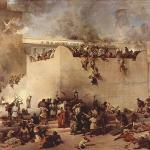+ Does The Word Order in Galatians 2:9 Suggest a Lowering of Peter’s Primacy?

The answer is yes:
Galatians 1:15-24 (RSV) But when he who had set me apart before I was born, and had called me through his grace, [16] was pleased to reveal his Son to me, in order that I might preach him among the Gentiles, I did not confer with flesh and blood, [17] nor did I go up to Jerusalem to those who were apostles before me, but I went away into Arabia; and again I returned to Damascus. [18] Then after three years I went up to Jerusalem to visit Cephas, and remained with him fifteen days. [19] But I saw none of the other apostles except James the Lord’s brother. [20] (In what I am writing to you, before God, I do not lie!) [21] Then I went into the regions of Syria and Cili’cia. [22] And I was still not known by sight to the churches of Christ in Judea; [23] they only heard it said, “He who once persecuted us is now preaching the faith he once tried to destroy.” [24] And they glorified God because of me.
He sought approval and a “commission” so to speak. That shows the authority of St. Peter and is quite consistent with the idea that he was the pope, because of the language. St. Paul specifically went to Jerusalem to see and “confer” with Peter: because he was the leader of the apostolic Church, and spent 15 days with him. Cephas is a Greek variation of Kepha: Aramaic for “Rock”: which was the new name Jesus gave Peter when He stated that He would be the leader of the new Church: built upon Peter (Matthew 16).
Protestants typically require everything to be absolutely explicit in Scripture, but that itself is not a requirement that is stated in the Bible. Nor do they follow it themselves. The canon of the Bible isn’t in the Bible at all. Nor is Sola Scriptura.
Even if we grant sola Scriptura for the sake of argument (I vehemently deny that the Bible teaches it at all), it only is so by such indirect argument and deduction, that it’s hardly different from Catholic proofs for the papacy or many other doctrines (including Christology and trinitarianism) that are present in essence and kernel, but aren’t yet greatly developed in the New Testament period.
There is more than enough biblical indication of the primacy of Peter, which is the essence of a papacy.
***
#46 of my fairly well-known paper, “50 New Testament Proofs for Peter’s Primacy & the Papacy” reads:
Paul went to Jerusalem specifically to see Peter for fifteen days in the beginning of his ministry (Gal 1:18), and was commissioned by Peter, James and John (Gal 2:9) to preach to the Gentiles.
One Claudio replied on my blog: “Point n°46: you wrote ‘Peter, James and John’ but in Gal 2:9 it is written ‘James, Peter and John’. Sorry.”
But I wasn’t quoting it directly. I would respond by noting that in ten places in the New Testament (RSV), Peter is listed first whenever all three are mentioned:
Matthew 10:2 The names of the twelve apostles are these: first, Simon, who is called Peter, and Andrew his brother; James the son of Zeb’edee, and John his brother;
Matthew 17:1 And after six days Jesus took with him Peter and James and John his brother, and led them up a high mountain apart.
Mark 5:37 And he allowed no one to follow him except Peter and James and John the brother of James.
Mark.9:2 And after six days Jesus took with him Peter and James and John, and led them up a high mountain apart by themselves; and he was transfigured before them,
Mark 13:3 And as he sat on the Mount of Olives opposite the temple, Peter and James and John and Andrew asked him privately,
Mark 14:33 And he took with him Peter and James and John, and began to be greatly distressed and troubled.
Luke 6:14 Simon, whom he named Peter, and Andrew his brother, and James and John, and Philip, and Bartholomew,
Luke 8:51 And when he came to the house, he permitted no one to enter with him, except Peter and John and James, and the father and mother of the child.
Luke 9:28 Now about eight days after these sayings he took with him Peter and John and James, and went up on the mountain to pray.
Acts 1:13 and when they had entered, they went up to the upper room, where they were staying, Peter and John and James and Andrew, Philip and Thomas, Bartholomew and Matthew, James the son of Alphaeus and Simon the Zealot and Judas the son of James.
Galatians 2:9 is an exception: “James and Cephas and John”. I would guess it is because James was the bishop of Jerusalem. Even so, in the preceding verses (2:7-8) and ones after (2:11-14), only Peter is referred to. And again, Paul refers to him alone in the similar circumstance described in Galatians 1:18: “Then after three years I went up to Jerusalem to visit Cephas, and remained with him fifteen days.” He adds, almost as a sort of “footnote” in the next verse: “But I saw none of the other apostles except James the Lord’s brother.” I had already noted the related Galatians 1:18 in #46 of my list of fifty.
I also (I notice now) had already dealt with this argument in three of my fifty points:
4. Peter’s name occurs first in all lists of apostles (Mt 10:2; Mk 3:16; Lk 6:14; Acts 1:13). Matthew even calls him the “first” (10:2). Judas Iscariot is invariably mentioned last.
5. Peter is almost without exception named first whenever he appears with anyone else. In one (only?) example to the contrary, Galatians 2:9, where he (“Cephas”) is listed after James and before John, he is clearly preeminent in the entire context (e.g., 1:18-19; 2:7-8).
36. Peter’s name is always the first listed of the “inner circle” of the disciples (Peter, James and John – Mt 17:1; 26:37,40; Mk 5:37; 14:37).
Matthew 26:37, 40 reads: “And taking with him Peter and the two sons of Zeb’edee, he began to be sorrowful and troubled. . . . [40] And he came to the disciples and found them sleeping; and he said to Peter, ‘So, could you not watch with me one hour?'” (cf. Mk 14:33, 37; Jn 21:3).
***
(originally 4-27-17 and 9-4-17)
Photo credit: Saints Peter and Paul, by the Roman School (anonymous), c. 1620 [public domain / Wikimedia Commons]
***













